
SYSTEMATIC PARASITOLOGY
Scope & Guideline
Connecting global researchers in the study of parasitology.
Introduction
Aims and Scopes
- Taxonomy and Systematics of Parasites:
The journal emphasizes the identification, classification, and description of new and existing parasitic species across various taxa, including helminths, arthropods, and protozoa. - Morphological and Molecular Characterization:
Research published in SYSTEMATIC PARASITOLOGY often employs both morphological and molecular techniques to provide a comprehensive understanding of parasite biology and phylogeny. - Host-Parasite Interactions:
The journal explores the ecological aspects of host-parasite relationships, including the effects of parasitism on host populations and the evolutionary adaptations of parasites. - Geographical Distribution and Biodiversity:
The journal publishes studies that assess the distribution and diversity of parasitic species across different ecosystems, contributing to the knowledge of biodiversity and conservation issues. - Emerging Parasites and Pathogens:
SYSTEMATIC PARASITOLOGY is also focused on the discovery and characterization of emerging parasitic species that pose threats to wildlife, domestic animals, or human health.
Trending and Emerging
- Integrative Taxonomy:
There is a growing trend toward integrative approaches that combine molecular data with traditional morphological analysis to resolve taxonomic ambiguities and establish clearer evolutionary relationships among parasites. - Molecular Phylogenetics:
Research focusing on molecular phylogenetics is on the rise, as it provides insights into the evolutionary history and relationships of parasitic species, aiding in the understanding of their diversification. - Environmental and Ecological Impacts of Parasitism:
Emerging studies are increasingly examining the ecological impacts of parasitism on ecosystems, addressing how parasites influence biodiversity and ecosystem stability. - Host Specificity and Co-evolution:
There is a notable increase in research exploring host specificity and co-evolutionary dynamics between parasites and their hosts, which is crucial for understanding the evolutionary pressures shaping parasite diversity. - Impact of Climate Change on Parasite Dynamics:
Recent publications are beginning to address how climate change affects the distribution and life cycles of parasites, highlighting the need for research that connects parasitology with climate science.
Declining or Waning
- Traditional Helminthology:
Research specifically dedicated to traditional helminthology, including the study of well-known helminth species and their life cycles, appears to be decreasing as attention shifts towards molecular techniques and integrative approaches. - Non-Parasitic Invertebrate Studies:
The journal has seen fewer studies focused on non-parasitic invertebrates, as the emphasis has shifted towards parasitic forms and their interactions with hosts. - General Reviews on Established Taxa:
There is a waning trend in comprehensive reviews of already established taxa, as researchers are increasingly focused on novel species descriptions and phylogenetic analyses.
Similar Journals
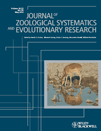
JOURNAL OF ZOOLOGICAL SYSTEMATICS AND EVOLUTIONARY RESEARCH
Connecting the Dots of Animal Science and EvolutionThe Journal of Zoological Systematics and Evolutionary Research, published by Wiley-Hindawi, stands as a premier academic journal since its establishment, showcasing cutting-edge research in the fields of Animal Science, Zoology, and Ecology. With an impressive track record spanning from 1963 to the present, this journal has earned a Q1 classification in both Animal Science and Ecology, as well as recognized rankings in Genetics and Molecular Biology. Its impact is highlighted by its Scopus ranks, placing it in the top percentile for relevant categories, underscoring its vital role in advancing knowledge and understanding within these disciplines. Researchers, professionals, and students will find a wealth of high-quality, peer-reviewed articles that contribute to the evolutionary understanding of biodiversity and systematics. Though not an Open Access journal, it remains accessible to a wide audience committed to exploring the intricacies of zoology and evolutionary biology.
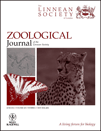
ZOOLOGICAL JOURNAL OF THE LINNEAN SOCIETY
Pioneering insights into the evolution of life.Zoological Journal of the Linnean Society, published by Oxford University Press, stands as a prestigious vessel for scholarly discourse in the fields of Animal Science and Ecology. With an ISSN of 0024-4082 and E-ISSN 1096-3642, this journal has an illustrious history dating back to its inception in 1866, and has consistently contributed groundbreaking research that shapes our understanding of zoology and evolutionary biology. Operating out of the United Kingdom, the journal boasts an impressive Q1 ranking in both Animal Science and Zoology and Ecology, Evolution, Behavior and Systematics, positioning it among the top tier of its category. With a significant presence in the academic landscape, the journal ranks 24th among 490 in Animal Science and 97th among 721 in Ecology, reflecting its impact and relevance in the field. Although it is not an open access journal, the wealth of knowledge it offers is invaluable for researchers, professionals, and students alike, aiding in the advancement of zoological sciences.
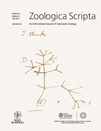
ZOOLOGICA SCRIPTA
Fostering innovation in genetics and evolutionary processes.Zoologica Scripta, published by Wiley, stands as a distinguished journal within the fields of Animal Science and Zoology, Ecology, Evolution, Behavior and Systematics, Genetics, and Molecular Biology. With its inception dating back to 1971 and a convergence year extending to 2024, this journal consistently provides a platform for high-quality research, earning a Q1 ranking in two key categories and solid performance in additional fields, as evidenced by its significant Scopus rankings and impressive percentiles. Notably, it ranks 36 out of 490 journals in Animal Science and Zoology, placing it in the 92nd percentile. While Zoologica Scripta operates under a traditional access model, its rigorous peer-review process ensures that only the most impactful studies make their way into its pages. With a focus on advancing our understanding of biodiversity and evolutionary processes, this journal is indispensable for researchers, professionals, and students committed to the ongoing exploration of animal sciences and ecological studies.
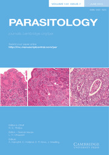
PARASITOLOGY
Pioneering research for a healthier tomorrow.PARASITOLOGY, published by Cambridge University Press, is a prestigious journal that has been at the forefront of research in the field of parasitology since its inception in 1908. This esteemed publication carries the ISSN 0031-1820 and E-ISSN 1469-8161, and its rigorous peer-reviewed articles provide insights into both fundamental and applied aspects of parasitic biology, infectious diseases, and host-parasite interactions. With a commendable impact factor, PARASITOLOGY ranks in the top quartile (Q1) for Animal Science and Zoology and holds Q2 rankings in both Infectious Diseases and Parasitology categories, indicating its significant influence and contribution to these disciplines. The journal's diverse scope allows for a broad range of research articles, reviews, and case studies, making it an essential resource for researchers, professionals, and students seeking to stay updated on the latest developments in the field. Based in the United Kingdom, PARASITOLOGY offers valuable access to critical research in an era where understanding parasitic diseases is more vital than ever, and continues to shape the future of this important scientific field.
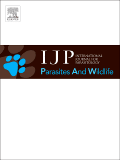
International Journal for Parasitology-Parasites and Wildlife
Unraveling Complexities of Parasites in NatureThe International Journal for Parasitology-Parasites and Wildlife, published by ELSEVIER, is a premier open-access journal dedicated to advancing the field of parasitology and wildlife research. Established in 2012, this influential journal has garnered a reputation for excellence, as evidenced by its impressive rankings, including Q1 in Animal Science and Zoology and Q2 in both Infectious Diseases and Parasitology as of 2023. With an ISSN of 2213-2244, this journal serves as a critical platform for researchers, professionals, and students, fostering a deeper understanding of parasite-host interactions and their ecological impacts. The journal encourages innovative studies that contribute to the mitigation of infectious diseases and enhance wildlife conservation efforts. With a commitment to open access, the International Journal for Parasitology-Parasites and Wildlife ensures that cutting-edge research is easily accessible to the global scientific community, helping to bridge gaps in knowledge and stimulate further inquiry.

REVISTA BRASILEIRA DE PARASITOLOGIA VETERINARIA
Exploring the Frontiers of Veterinary Parasitology KnowledgeThe REVISTA BRASILEIRA DE PARASITOLOGIA VETERINARIA, published by the BRAZILIAN COLLEGE OF VETERINARY PARASITOLOGY, serves as a premier platform for disseminating groundbreaking research and advancements in the field of veterinary parasitology. Since its transition to Open Access in 2007, the journal has significantly contributed to fostering global collaboration and knowledge sharing among researchers and practitioners. Situated in Brazil, this esteemed journal features a diverse range of studies focused on the latest developments and challenges in veterinary and parasitological sciences. With a commendable Q3 ranking in Parasitology and Q2 ranking in Veterinary (miscellaneous) for 2023, it is recognized for its growing impact in the academic community, particularly holding positions in the 60th percentile for General Veterinary and 37th percentile in Parasitology. Researchers, professionals, and students interested in enriching their understanding of veterinary parasitology will find this journal a vital resource, as it bridges regional expertise with global research trends, thus embracing a holistic approach to veterinary health.

Journal of Insect Biodiversity
Exploring the Intricacies of Insect LifeJournal of Insect Biodiversity, published by MAGNOLIA PRESS in New Zealand, offers a vital platform for researchers and professionals interested in the intricate world of insect science. Established in 2019, this journal covers a wide array of topics within its field, focusing on the ecological, evolutionary, and behavioral aspects of insects, while also engaging with paleontological perspectives. With an impressive Q2 and Q3 categorization in multiple ecological disciplines and a growing influence in the Scopus rankings, it serves as an essential resource for scholars aiming to deepen their understanding of insect diversity and its implications for ecosystems. The journal is committed to open access, promoting the dissemination of knowledge without barriers. Researchers, students, and professionals alike will benefit from the timely contributions this journal offers as it continues to reflect the dynamic and evolving nature of insect research up to the year 2024.
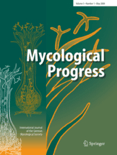
MYCOLOGICAL PROGRESS
Advancing fungal research for a sustainable future.MYCOLOGICAL PROGRESS, published by SPRINGER HEIDELBERG, is an esteemed journal dedicated to advancing the field of mycology and associated biological disciplines. With an ISSN of 1617-416X and an E-ISSN of 1861-8952, this journal has established itself as a leading source of high-quality research, evidenced by its impressive rankings in the Q1 quartile across various categories such as Agricultural and Biological Sciences, Ecology, and Plant Science. As of 2023, MYCOLOGICAL PROGRESS ranks 37 out of 193 in Agricultural and Biological Sciences (miscellaneous) and 183 out of 721 in Ecology, demonstrating its significant impact in the ecosystem of scientific literature. This journal not only aims to disseminate innovative research findings but also strives to foster interdisciplinary collaboration among scientists, ecologists, and agriculturists around the globe. While retaining a traditional model of publication, MYCOLOGICAL PROGRESS remains crucial for those seeking to deepen their understanding of fungal biology and its broader environmental implications.
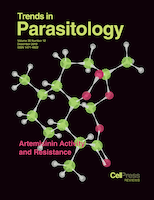
TRENDS IN PARASITOLOGY
Exploring the dynamics of infectious diseases.TRENDS IN PARASITOLOGY is a premier academic journal published by CELL PRESS, focusing on the dynamic field of parasitology and infectious diseases. With an ISSN of 1471-4922, this esteemed journal is recognized for its high impact within the research community, boasting a Q1 ranking in both the Infectious Diseases and Parasitology categories as of 2023. This places it among the top-tier journals in the field, as evidenced by its remarkable Scopus rankings, where it ranks #3 out of 79 in Parasitology and #29 out of 344 in Infectious Diseases. Spanning over two decades of scholarly contributions from 2001 to 2024, TRENDS IN PARASITOLOGY emphasizes the latest advancements, challenges, and innovative methodologies in parasitology, making it an invaluable resource for researchers, healthcare professionals, and students alike. With an increasing focus on open access initiatives, this journal not only promotes widespread dissemination of knowledge but also encourages collaboration across the global scientific community. Whether you are investigating novel interventions, exploring parasite evolution, or understanding host-pathogen interactions, TRENDS IN PARASITOLOGY remains at the forefront of research, driving forward the understanding of parasitic diseases.

Parasites Hosts and Diseases
Transforming Understanding of Parasitic DiseasesParasites Hosts and Diseases is an emerging academic journal focusing on the intricate relationships between parasites, their hosts, and associated diseases. Published by the Korean Society of Parasitology in collaboration with Seoul National University College of Medicine, this journal is a significant contribution to the fields of Infectious Diseases and Parasitology, and it has secured a place in the Q3 category for both disciplines as of 2023. With an ISSN of 2982-5164 and an E-ISSN of 2982-6799, this open-access publication aims to foster scholarly communication and provide a platform for researchers to disseminate their findings on critical issues related to parasitic infections and the pathogenesis thereof. Although it is still in the early stages of its history, the journal has already positioned itself as a useful resource within its field, with Scopus rankings showing it as 48th of 79 in Parasitology and 210th of 344 in Infectious Diseases, indicating its growing influence and the potential for impactful research. Situated in South Korea, and via its open-access model, Parasites Hosts and Diseases is committed to reaching a global audience of scientists, healthcare professionals, and students, all dedicated to understanding and combating the challenges posed by parasitic diseases.